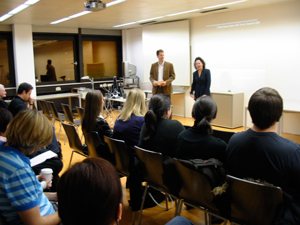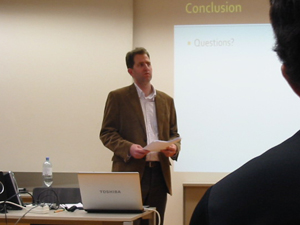American Corner Innsbruck
Lecture by Brad Varley, J.D., M.A.
NUCLEAR EXPANSION, GLOBAL SECURITY, AND THE CURRENT STATE OF INTERNATIONAL LAW
Nov. 18, 2009, 5.15 p.m., room 50105/2 (Bruno-Sander-Haus, 1st floor)


The American Corner welcomed Brad Varley, J.D., M.A., an in-house legal counsel for Plansee, who shared his extensive knowledge of nuclear proliferation with the audience.
Mr. Varley introduced his listeners to this topical issue with a historical survey beginning with the birth of nuclear weapons as a result of the Manhattan Project and ending with the termination of the Cold War, during which the United States and the Soviet Union wielded an atomic arsenal with the potential for mutual assured destruction (condensed in the fitting acronym M.A.D.). The fears of living in the nuclear shadow have abated since the collapse of the Soviet Union (although both U.S. and Russian storages are still stacked with thousands of warheads), yet they have been replaced by new concerns, as the availability of nuclear power for civilian purposes is a double-edged sword. The equation is simple: the greater the expansion of nuclear power, the higher the possibility of someone misusing it.
As Mr. Varley pointed out, numerous attempts at bridling proliferation have already been undertaken, yet most institutions and treaties literally remain paper tigers. For example, the International Atomic Energy Agency (IAEA), charged with the global surveillance and safeguarding of nuclear activities, has to grapple with a low budget and relies on countries to self-report on their nuclear status. Agreements such as the Non-Proliferation Treaty (NPT) seek to curb potential arms races by prohibiting members from developing nuclear weapons. Unfortunately, the treaty has multiple weak spots, since many states have not agreed to its Additional Protocol (which would allow the IAEA to verify compliance with the NPT), parties are not prohibited from possessing enrichment or reprocessing technology, have the right to withdraw from the NPT, and do not face express penalties for lying to the IAEA. However, the obstacles to change are not only located in the international arena. As vital a role as the United States must play in the reduction of nuclear weapons and the restraining of proliferation, it has to face several problems of its own first, since gridlock in internal politics as well as structural barriers (e.g. the Advice and Consent Clause of the U.S. Constitution that requires a two-thirds majority in the Senate for treaty ratification) considerably slow down the legislative process.
Having outlined the shortcomings of international regulations, non-proliferation treaties, and the hurdles of internal politics, Mr. Varley concluded with his outlook on the future development of nuclear expansion and international law: A change in consciousness has to take place, the international perspective has to go beyond immediate benefits or losses, nuclear weapons must cease to be regarded as the “ultimate currency of power,” and transnational security needs to be increased significantly, since checking nuclear proliferation has become everyone’s business in an interconnected world.
(text: Andreas Leisner)

Abstract
President Obama has signaled that the U.S. is ready to take steps to reduce its nuclear arsenal. He finds support from many leaders across the political spectrum both in the U.S. and abroad, so historic changes may be possible over the next year. A world without nuclear weapons will need U.S. leadership, but above all it will require trust, cooperation, and resolve in and among the international community. It will require a greater commitment to and further developments in international law as well as sufficient funding and legal authority for the institutions charged with administering and enforcing the laws. As President Obama stated at the recent UN Summit in September, “The world must stand together and demonstrate that international law is not an empty promise.”
Brad Varley will talk about the current state of international law in this area and the threats posed by the expansion of nuclear weapons, nuclear know-how and nuclear material around the globe.
Brad Varley
Brad Varley was born and raised in Los Alamos, where the first atomic bomb was developed as part of the Manhattan Project, and he studied U.S. and international law at American University Washington College of Law in Washington, D.C. He works as in-house Legal Counsel for Plansee in Tirol, Austria and maintains a strong interest in international law and global security. He is 31 years old, married, and has a three year old son.


